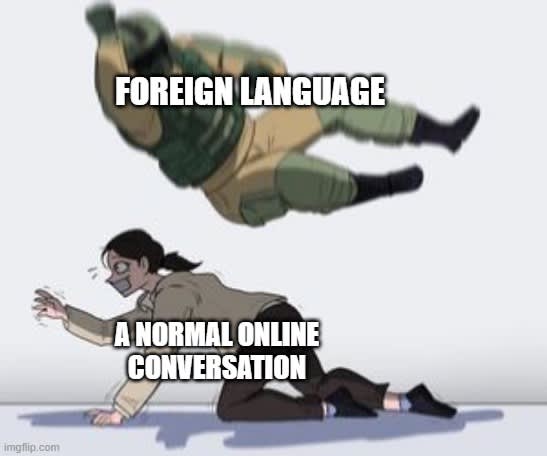Why "Conversational" is the Perfect Second Language Goal
Setting up your language learning goals to reach conversational as fast as possible
Welcome, aspiring polyglot! This week I began lessons with a new student who is learning English as a second language. A Polish man looking for a career change who wants to ensure his English language skills will not hinder him during his job search.
After our initial discussion, something I could not stop thinking about is how important the ability to hold a conversation in your target language, however labored it may be starting out. For that reason I wanted to take a look at goal setting for those who are working on their second, third, fourth, or fifth language right now; and why "Conversational" is the best goal you can have.
Why you need goals for your second language acquisition
Having language learning goals is vital for your medium to long term language acquisition success. At first the excitement of learning new words will be enough, but that will quickly fade. Eventually you will feel like you are forcing yourself to sit down and study and, to an extent, you are. On those days when you really do not want to sit down and put in work towards becoming bilingual, your goals will do a few things for you.
1. They will help you remember why you started learning a new language
Whether you chose your target language because you have a family connection to it or because it is going to land you a pay raise at your job, having defined goals will help you keep your reason for starting center of mind. If remembering why you chose to learn a new language in the first place is not a good enough reason to go and study, seeing how far you've come might be.
2. A way to track your progress
When you have your goals defined you will inevitably have a work history. Ideally this will come in the form of writing you have done, but it can also be books you've read, shows you have watched, music you tried to translate, anything that demonstrates how far you have made it since starting.
Being able to visualize everything from the minute you started to the present day is powerful. Your fragmented and broken sentences turning into phrases that flow and are far more precise. An inability to adequately express yourself turning into satisfying self expression.
3. Giving yourself time to celebrate
Finally, setting proper goals for your language acquisition will ensure you take time to celebrate your wins as they come. If you need help defining what constitutes a win during your language acquisition, make sure to check out this article on precisely that topic:
How to Know You're Winning
Welcome, budding polyglot! As I am certain you know, one of the most frustrating aspects of learning a new language is that there are times when it feels like absolutely no progress is being made. Weeks on end where it feels like the same subjects and material are being covered incessantly. I have felt this way with every language I have tried to learn …
Duolingo and many other language learning apps take this to the extreme. Giving people a dopamine hit for the same thing mainstream classrooms do, minor memorization success. That is a nice way to do things, but it is not efficient nor is it effective.
You do deserve to celebrate your wins, but you also need to be making progress. Otherwise this method becomes a problem as you start celebrating your ability to stay busy rather than your wins in language learning. Specificity is crucial for your goal setting for that reason.
The importance of specificity in goal setting
There are three things you need to keep in mind when it comes to reaching a conversational level in your language skills. The first and probably least important is having a deadline. Having some form of pressure on yourself is helpful, but it can be difficult when it is self imposed.
A best case scenario is that you have someone in your life who you can share your goals with for a bit of outside accountability. We are happy to be that outside resource for you if necessary, simply leave a comment or respond to any of these emails.
Aside from having specific deadlines for your progress, you should be focused on the language acquisition equivalent of progressive overload. When in the gym this simply means adding one or two more reps to your working sets, maybe adding 5lbs and training back up from sets of 8 to sets of 12 or 15. Here are some ways you can add it into your second language acquisition:
1. Add 5 new vocabulary words to your vocabulary base
2. Study 1-2 new grammar structures and practice them in 5-10 sentences
3. Read one sentence out loud, then 2, then 3, and continue stacking
4. Translate one verse of a new song, then two, then a stanza, then the whole song
5. Read 1 page/night, then 2 pages, then 3. Keep going until you get tired and/or stop understanding
Progressive overload looks different in second language acquisition than it does in the gym, but the principles are the same. Improve on what you have done in the past, however incrementally, and watch as your language learning process accelerates.
You will be shocked by how much you can accomplish when you are working consistently towards a goal day in and day out for months. Putting all of these things together will help you reach conversational as quickly as possible and, as mentioned above, that should be your primary goal in any language you are learning.
How you can use conversation to achieve native speaker-like fluency
Conversational is such a powerful level to reach in second language acquisition because it puts an end to the most difficult phase: the silent period. For those who are curious what that means, check out this article we put together about it:
Understanding the Silent Period of Second Language Acquisition
Welcome, aspiring polyglot! With many in the community beginning new languages, myself included, there is something that needs to be discussed. The silent period of language acquisition. Something everyone is bound to experience, even those who are living abroad and studying in complete immersion.
Once you are able to hold complete conversations you no longer have to sequester yourself to studying out of textbooks or trying to memorize basic phrases. Even if they are basic conversations, you will learn more through doing than you will through studying and theorizing. Not only that, but the immediate corrections that are almost inherent to conversations with native speakers will open your eyes to more possibilities than the limited information in a book.
Through conversation you will have endless opportunities to improve. You can start out by discussing topics you know well and expand over time into more complex domains that are outside of your wheelhouse. As you continue down this path your goal is to use conversations to learn how to think in your new language. At first you will almost certainly be translating everything you hear and everything you plan to say. That is, and I cannot stress this enough, a good and normal thing to experience.
You will not stop there, but it is a completely normal part of the process. Translating in your head is frustrating, but you have to do it in order to get to a point where you no longer need to do it. Training yourself to think in a new language is no easy feat and it will take time, but the more you do it the faster that time will pass. That is why getting to a conversational level as quickly as possible is so beneficial. If you are going to put all the time and effort into learning a new language you might as well use it as often as possible.
Conversations to build momentum in your language skills
An unexpected side effect of conversing in your target language will be mounting confidence. Most of the time when you are afraid you will come up with countless excuses for why you cannot speak. In reality, you are making the choice that you will not speak.
Irrespective of how well your first conversation goes, it will be out of the way. Once you have one conversation under your belt, the next one is easier and each subsequent conversation after that will continue to be easier. This is not necessarily because you are better. It is likely because you are less afraid.
Using the momentum you build as you perfect certain phrases and master the pronunciation of even the most challenging of words to carry you from conversational to fluent is the end goal. However, you must learn to walk before you can run and conversational is the walking stage of second language acquisition.
On top of your ability to go from five minute to ten minute to hour long conversations, you will be able to go back and look at your previous work and really see and understand how far you have come from only being able to write simple phrases and chart conjugations.
Conclusion
Momentum is a powerful force that you need to be maximizing throughout the duration of your second language acquisition. Striving to reach a conversational level as fast as possible is a phenomenal goal and it will separate you from the language learners who spend years working on language theory rather than practicing tangible language skills.
Until you are speaking, you might find that you do not really know how to express certain sentiments. More often than not, there are colloquialisms that you will use more than actual sentences you picked up from apps.
Words have fluid definitions, whether or not one believes they should, and I do not. Knowing those definitions and how you can express the same feeling or action in multiple ways is a skill you develop through speaking. Many concepts are not explored in mainstream classrooms because the instructors simply do not know they exist.
When you take the time to cultivate relationships with native speakers you give your chance to learn first hand how the people who speak your target language choose to form their sentences. Learning new vocabulary words from them will give you a little breathing room as you work to transfer your new knowledge from your short term memory to your long term memory.
Breaking down the language barrier is paramount to learning foreign languages. Mastering the spoken word takes time, but it give you an insight into a new culture and access to native speakers to increase your language output.
As we discuss often around here, creating is vital in second language acquisition. Speaking and practicing with written language will help you in accelerating and enhancing your language learning process, so start having conversations as early on as possible. It will be difficult, but you can do difficult things and be great. So go do some difficult things and become great.
Eager for more Second Language Strategies?
For more content find me on Twitter or Instagram. If you are struggling to get speaking in your target language, get up to 55% off a Babbel subscription using this link. I look forward to seeing everyone’s progress in the months and years to come. Don't forget to check out the YouTube channel as well!









